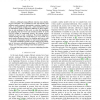Free Online Productivity Tools
i2Speak
i2Symbol
i2OCR
iTex2Img
iWeb2Print
iWeb2Shot
i2Type
iPdf2Split
iPdf2Merge
i2Bopomofo
i2Arabic
i2Style
i2Image
i2PDF
iLatex2Rtf
Sci2ools
RTCSA
2009
IEEE
2009
IEEE
Managing Imprecise Worst Case Execution Times on DVFS Platforms
Abstract—Although energy-efficient real-time task scheduling has attracted a lot of attention in the past decade, most existing results assumed deterministic execution lengths for tasks, or probabilistic lengths with a stable distribution. Such an assumption results in significant difficulty in their application to real problems. In this work, we relax this hypothesis by assuming that the worst case execution number of cycles (WCEC) might be imprecisely known. We present several methods to react to such a situation. We provide simulation results attesting that with a small effort, we can provide very good results, allowing to keep a low deadline miss rate as well as an energy consumption similar to clairvoyant algorithms. The main contribution of this work is to improve the robustness of low-power scheduling algorithms on DVFS (Dynamic Voltage and Frequency Scaling) frame-based platforms. Keywords-Real-time system; Low-power scheduling; Stochastic model
Deterministic Execution Lengths | Low-power Scheduling | Real-Time Computing | Real-time Task Scheduling | RTCSA 2009 |
| Added | 21 May 2010 |
| Updated | 21 May 2010 |
| Type | Conference |
| Year | 2009 |
| Where | RTCSA |
| Authors | Vandy Berten, Chi-Ju Chang, Tei-Wei Kuo |
Comments (0)

